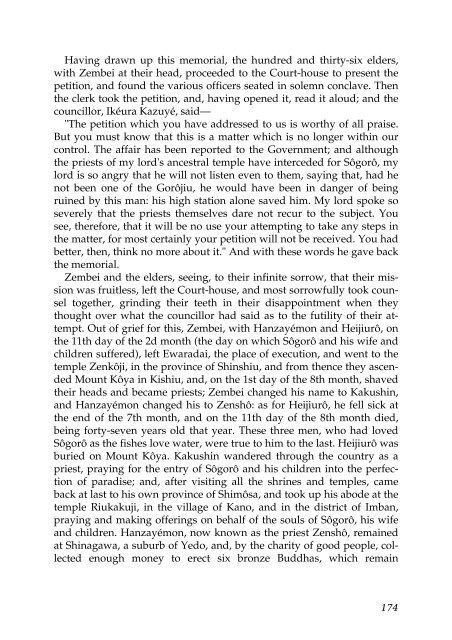Create successful ePaper yourself
Turn your PDF publications into a flip-book with our unique Google optimized e-Paper software.
Having drawn up this memorial, the hundred and thirty-six elders,<br />
with Zembei at their head, proceeded to the Court-house to present the<br />
petition, and found the various <strong>of</strong>ficers seated in solemn conclave. Then<br />
the clerk took the petition, and, having opened it, read it aloud; and the<br />
councillor, Ikéura Kazuyé, said—<br />
"The petition which you have addressed to us is worthy <strong>of</strong> all praise.<br />
But you must know that this is a matter which is no longer within our<br />
control. The affair has been reported to the Government; and although<br />
the priests <strong>of</strong> my lord's ancestral temple have interceded for Sôgorô, my<br />
lord is so angry that he will not listen even to them, saying that, had he<br />
not been one <strong>of</strong> the Gorôjiu, he would have been in danger <strong>of</strong> being<br />
ruined by this man: his high station alone saved him. My lord spoke so<br />
severely that the priests themselves dare not recur to the subject. <strong>You</strong><br />
see, therefore, that it will be no use your attempting to take any steps in<br />
the matter, for most certainly your petition will not be received. <strong>You</strong> had<br />
better, then, think no more about it." And with these words he gave back<br />
the memorial.<br />
Zembei and the elders, seeing, to their infinite sorrow, that their mission<br />
was fruitless, left the Court-house, and most sorrowfully took counsel<br />
together, grinding their teeth in their disappointment when they<br />
thought over what the councillor had said as to the futility <strong>of</strong> their attempt.<br />
Out <strong>of</strong> grief for this, Zembei, with Hanzayémon and Heijiurô, on<br />
the 11th day <strong>of</strong> the 2d month (the day on which Sôgorô and his wife and<br />
children suffered), left Ewaradai, the place <strong>of</strong> execution, and went to the<br />
temple Zenkôji, in the province <strong>of</strong> Shinshiu, and from thence they ascended<br />
Mount Kôya in Kishiu, and, on the 1st day <strong>of</strong> the 8th month, shaved<br />
their heads and became priests; Zembei changed his name to Kakushin,<br />
and Hanzayémon changed his to Zenshô: as for Heijiurô, he fell sick at<br />
the end <strong>of</strong> the 7th month, and on the 11th day <strong>of</strong> the 8th month died,<br />
being forty-seven years old that year. These three men, who had loved<br />
Sôgorô as the fishes love water, were true to him to the last. Heijiurô was<br />
buried on Mount Kôya. Kakushin wandered through the country as a<br />
priest, praying for the entry <strong>of</strong> Sôgorô and his children into the perfection<br />
<strong>of</strong> paradise; and, after visiting all the shrines and temples, came<br />
back at last to his own province <strong>of</strong> Shimôsa, and took up his abode at the<br />
temple Riukakuji, in the village <strong>of</strong> Kano, and in the district <strong>of</strong> Imban,<br />
praying and making <strong>of</strong>ferings on behalf <strong>of</strong> the souls <strong>of</strong> Sôgorô, his wife<br />
and children. Hanzayémon, now known as the priest Zenshô, remained<br />
at Shinagawa, a suburb <strong>of</strong> Yedo, and, by the charity <strong>of</strong> good people, collected<br />
enough money to erect six bronze Buddhas, which remain<br />
174



